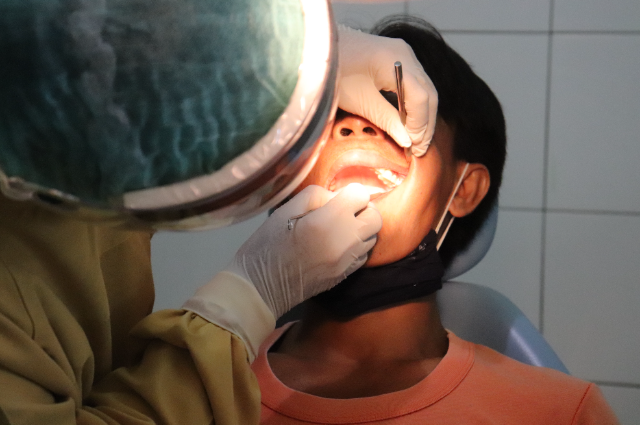
Photo by Mufid Majnun on Unsplash
The relationship between oral health and systemic health is an intricate and vital aspect of overall well-being. Often overlooked, the condition of our mouths can significantly impact various systems within the body. This connection has been a subject of extensive research, shedding light on the profound implications of oral health on systemic conditions.
Starting with the oral cavity itself, maintaining good oral hygiene is not solely about having a sparkling smile; it plays a pivotal role in preventing oral diseases such as periodontal (gum) disease, tooth decay, and oral infections. These conditions, if left untreated, can lead to significant consequences not only within the mouth but also throughout the body.
Periodontal disease, in particular, has been linked to various systemic health issues. The inflammation caused by gum disease has been associated with conditions like cardiovascular disease, diabetes, and adverse pregnancy outcomes. The bacteria involved in periodontal disease can enter the bloodstream, potentially contributing to the development or exacerbation of these systemic conditions.
Furthermore, poor oral health has also been correlated with respiratory infections. Bacteria from the mouth can be aspirated into the lungs, causing respiratory issues, especially in individuals with compromised immune systems or existing respiratory conditions.
The relationship between oral health and diabetes is bidirectional. Not only does diabetes increase the risk of gum disease, but untreated gum disease can make it more challenging to control blood sugar levels, leading to complications for individuals with diabetes.
In pregnant women, poor oral health has been associated with preterm birth and low birth weight. Hormonal changes during pregnancy can increase the risk of developing gum disease, emphasizing the importance of maintaining good oral hygiene during this crucial time.
The oral cavity also serves as an entry point for infections and bacteria that can potentially affect other body systems. Endocarditis, an infection of the heart's inner lining, can occur when bacteria from the mouth enter the bloodstream and attach to damaged areas of the heart.
This interconnectedness underscores the significance of regular dental check-ups, proper oral hygiene practices, and prompt treatment of oral conditions. Brushing and flossing daily, along with routine dental visits, can go a long way in preventing oral diseases that might have systemic implications.
The oral cavity is considered the "window to general health" and is the intersection of dentistry and medicine. It is the basis for addressing over 100 systemic diseases and over 500 medications, with oral manifestations being more prevalent in the older population. The relationship between oral and systemic health conditions is not fully understood, and more research is needed to understand the bidirectional relationship. The importance of oral health on overall health has been emphasized by US surgeons and the World Health Organization. Access to dental and medical care is complicated by factors like availability, cost, insurance, cultural issues, and fear.
The mouth and oral cavity are vital for the body's interaction with the external environment, including speech, chewing, swallowing, and digestion. The oral cavity is colonized by 500-700 species of bacteria, viruses, fungi, and protozoa, with many being virulent. Oral hygiene significantly impacts the oral microbiome, with good hygiene resulting in a simple flora dominated by gram-positive and rod-like organisms, while poor hygiene leads to a more diverse flora. The oral cavity is also filled with fluids, primarily saliva and gingival crevicular fluid, which maintain a healthy oral environment. The relationship between saliva and bacteria can protect teeth by maintaining mineralization and reducing dietary acid exposure.
Good oral health benefits economic, social, psychological, and physical health. Poor dentition leads to poor chewing and nutritional intake. Regular dental care prevents periodontal disease and stratifies patients at risk for serious systemic conditions. Good oral care reduces healthcare expenditures, and patients with good oral health are less likely to enter long-term care facilities. Oral conditions impact systemic conditions like atherosclerosis, pulmonary disease, diabetes, pregnancy, and kidney disease.
Diabetes is a chronic condition causing disrupted glycemic control due to lack of insulin production or systemic insulin resistance. Prolonged exposure to hyperglycemia is the primary cause of complications, including heart, eyes, kidneys, and peripheral nerves. Periodontal disease is a major complication of diabetes, with individuals at least three times more likely to develop periodontitis. However, well-controlled diabetes patients have no increased risk of periodontitis. Diabetic patients have deeper gingival pockets, increased alveolar bone loss, abscess formation, and poor healing. Prolonged exposure to hyperglycemia leads to advanced glycation end products, leading to local inflammation and loss of connective tissue. Treatments for periodontitis and glycemic control can be improved through mechanical biofilm removal and oral antibiotics.
The medical and dental professions aim to optimize patients' health, with major conditions like atherosclerotic vascular disease, pulmonary disease, diabetes, and pregnancy-related complications affecting a large percentage of the population. While oral disease treatment has not significantly impacted these systemic conditions, maximizing a patient's health is advantageous. Primary prevention is crucial, and modifying coexisting conditions may prevent life-threatening medical outcomes.
